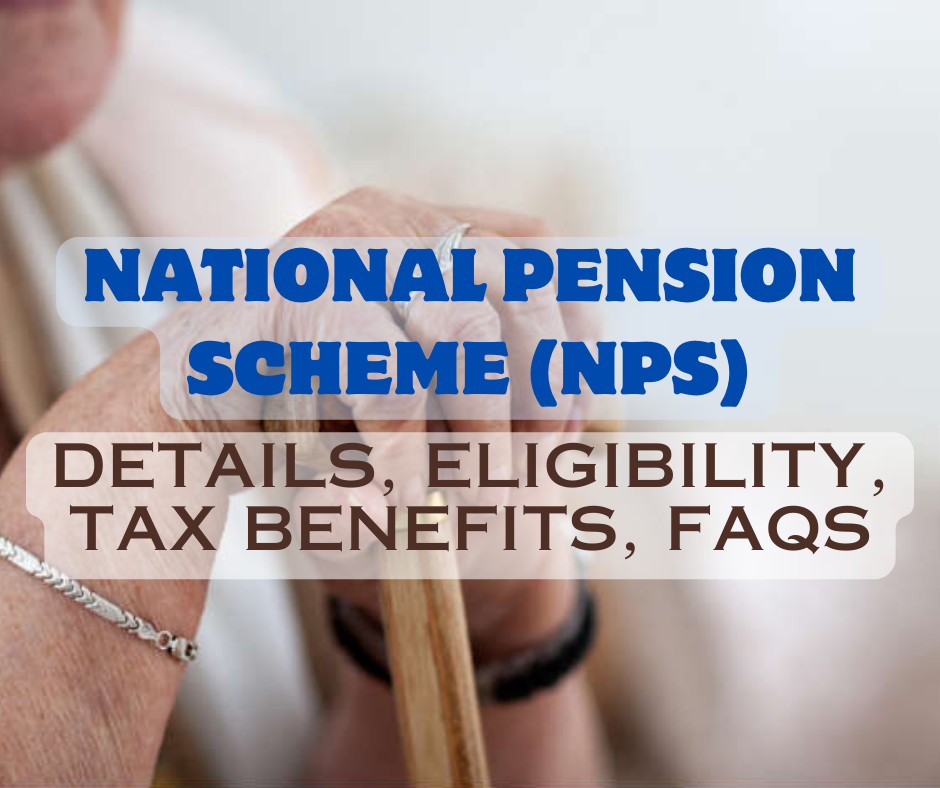
Table of Contents
National Pension Scheme (NPS): Your Path to a Secure Retirement
The National Pension Scheme (NPS) is a savings plan for your retirement that you can join voluntarily. It’s designed to help you save regularly for your future, particularly for your retirement. The goal is to ensure you have a steady source of income in the form of a pension when you stop working, making it a sustainable solution for every Indian’s retirement needs.
When you decide it’s time to exit the NPS program, you have options. You can use the money you’ve saved in your pension account to purchase a life annuity from a life insurance company authorized by the Pension Fund Regulatory and Development Authority (PFRDA). Alternatively, you can choose to withdraw a portion of your accumulated pension savings as a lump sum. It’s worth noting that PFRDA is the central agency responsible for implementing and monitoring the NPS program.
Who Can Open an NPS Account Under the All Citizen Model?
If you’re an Indian citizen, whether you live in India or abroad, and you’re between 18 and 70 years old when you apply, you can open an National Pension Scheme (NPS) account. You also need to meet the Know Your Customer (KYC) requirements.
Benefits of Having an NPS Account
Low Cost
NPS is one of the world’s most cost-effective pension schemes. The administrative fees and fund management charges are also minimal.
Simple
To get started, all you need to do is open an account with a Point of Presence (POP), which you can find at Head Post Offices across India. You’ll receive a Permanent Retirement Account Number (PRAN).
Flexible
You can choose your own investment options and pick a Pension Fund, or you can let it automatically allocate your investments for better returns.
Portable
Your National Pension Scheme account is easy to manage no matter where you are in India. You can contribute through any POP-Service Provider (POP-SP), even if you move to a different city or change jobs. You can also make contributions online through eNPS. If your employment changes, you can shift your account to another sector, like the Government Sector or Corporate Model.
NPS Interest Rate
The interest you earn with NPS depends on how well the underlying NPS funds perform. Historically, NPS investments have had an average return of around 10% in recent years, making it an attractive long-term investment for your financial planning.
Attractive Market-Linked Returns
NPS investments are linked to the market, and the returns depend on the performance of the underlying NPS funds. In the past, NPS investments have provided better returns than traditional savings accounts and fixed deposits, making it a compelling choice.
Tax Benefits of National Pension Scheme
National Pension Scheme offers tax benefits to both employees and the self-employed
Employee’s Contribution
You can get a tax deduction of up to 10% of your salary (Basic + DA) under Section 80 CCD(1), within the overall limit of Rs. 1.50 lakh under Section 80 CCE.
Employer’s Contribution
You can get a tax deduction of up to 10% of your salary (Basic + DA) that your employer contributes under Section 80 CCD(2), in addition to the limit of Rs. 1.50 lakh under Section 80 CCE.
Self-Employed
If you’re self-employed, you can get a tax deduction of up to 10% of your gross income under Section 80 CCD(1), within the overall limit of Rs. 1.50 lakh under Section 80 CCE. You can also get additional deductions for extra contributions up to a maximum of Rs. 50,000 under Section 80 CCD 1(B).
*Please note that tax benefits are subject to the Income Tax Act, 1961, as amended.
Frequently Asked Questions (FAQs)
Q1. What is the National Pension Scheme ?
The NPS is a government-backed scheme designed to provide financial security in old age. It’s a regulated investment plan managed by the Pension Fund Regulatory and Development Authority (PFRDA).
Q2. What Are the Different Sectors in NPS?
NPS can be broadly classified into two categories and it is further customised for different sectors as mentioned below:
Government Sector
- Central Government
The National Pension System (NPS) was launched by the Central Government on January 1, 2004, except for the armed forces. All employees who joined Central Autonomous Bodies after this date are required to be a part of the Government sector of NPS. These employees, both from the Central Government and CABs, contribute a portion of their monthly salary to their pension fund, and their employers match that contribution.
- State Government
Following the Central Government’s lead, several State Governments have adopted this system, each implementing it at different times. State Autonomous Bodies (SABs) can also opt for NPS if their respective State Government or Union Territory (UT) has adopted the NPS framework and started implementing it. State Government and SAB employees also contribute to their pension funds from their monthly salaries, and their employers match these contributions.
Private Sector (Non-Government Sector)
- Corporates
The NPS Corporate Sector Model is a customized version of NPS designed to accommodate various organizations and their employees. It allows these organizations to integrate NPS within the scope of their employer-employee relationship.
- All Citizens of India
Starting from May 1, 2009, any individual who doesn’t fall into the categories mentioned above has the option to join the NPS framework under the “All Citizens of India” sector.
Q3. Why Should I Open an NPS Account?
NPS has several advantages compared to other pension products, such as low costs, tax benefits, market-linked returns, portability, professional management, and regulatory oversight by the PFRDA.
Q4. Who Can Join NPS?
Any Indian citizen aged 18 to 70 can join NPS.
Q5. Can an NRI Join NPS?
Yes, NRIs can open NPS accounts, but contributions are subject to regulatory requirements from RBI and FEMA. However, OCI (Overseas Citizens of India) and PIO (Person of Indian Origin) cardholders and HUFs are not eligible for opening of NPS account.
Q6. Can I Open Multiple NPS Accounts?
No, you can have only one NPS account, but you can also have an account in the Atal Pension Yojana.
Q7. Can I Open an NPS Account Jointly?
No, NPS accounts are for individuals only, not joint accounts.
Q8. How Does NPS Work?
Once you successfully sign up for the National Pension System (NPS), you receive a Permanent Retirement Account Number (PRAN). When PRAN is generated, you’ll get email and text message alerts on your registered email ID and mobile number from NSDL-CRA (Central Record Keeping Agency).
As you work, you regularly contribute to your NPS account to build up your retirement savings. When you retire or exit the program, the money you’ve saved in your NPS account, known as the corpus, becomes available to you. It’s important to note that a part of this corpus is required to be invested in an annuity plan. This annuity plan ensures you receive a monthly pension after retirement or when you exit the NPS program.
For more details, you can visit government website of National Pension Scheme on the link below: NPS CRA NSDL
You can also read:

5 thoughts on “National Pension Scheme (NPS): Details, Eligibility, Tax Benefits, FAQs”